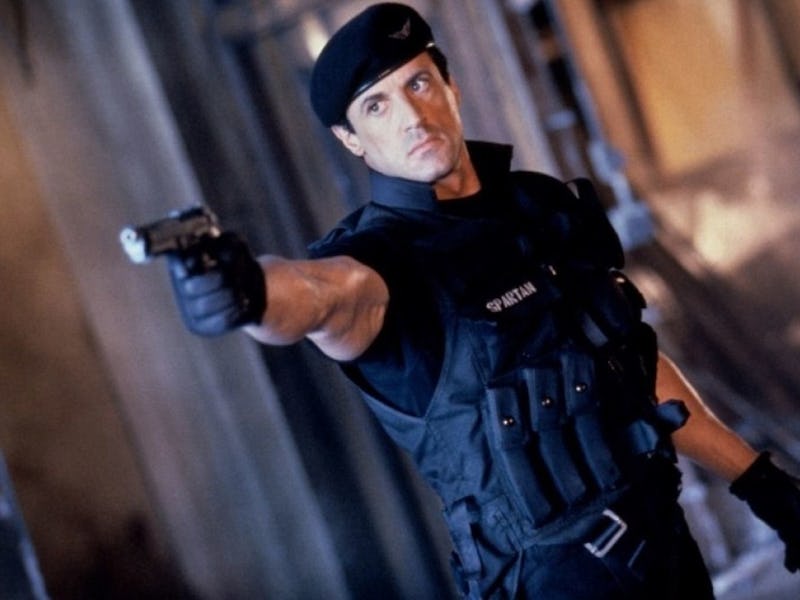You need to watch the most explosive sci-fi action movie on HBO Max ASAP
'Demolition Man' has stood the test of time.

It’s no coincidence that Daniel Waters, the lead writer credited on 1993’s Demolition Man, had previously written the black-comedy cult classic Heathers, remembered as a classic of the ‘80s.
Both movies took popular genres of their eras — the big-budget action movie and the teen comedy, respectively — and turned them on their heads with wit and dramatic depth. Though Demolition Man is certainly remembered as a particularly silly burst of high-octane action, its performances really give it an edge.
Now that the film is streaming on HBO Max, here’s why you should give it another look.
Directed by Marco Brambila, Demolition Man starts with a bang. As captured in its opening scene, the famous Hollywood sign in Los Angeles is on fire. In a hellish 1996 Los Angeles, Sylvester Stallone’s John Spartan is hunting down Simon Phoenix (Wesley Snipes, of Blade fame). This first scene is very easily stolen by Snipes, who goes full maniac in his role, cackling about missing hostages as he attempts to burn Stallone alive.
Tremendous explosions ensue, including one that engulfs an entire building; according to Brambila, speaking to Syfy, this set was an old government building in L.A., previously scheduled for demolition. The movie crew just added “gasoline and pyrotechnics” to make its decimation look especially cool.
But after the explosions, and once Spartan captures Phoenix, both characters are cryogenically frozen. They’re on ice until the year 2032, when Phoenix is enabled to escape during a parole hearing. He has some help, but this grand bid for freedom comes together more easily than one might expect. By 2032, society has radically changed from 1996’s fire-and-brimstone landscape. Rather, it has become a seemingly idyllic paradise. Nobody really knows what crime is, especially the police. It’s not even Los Angeles anymore — the city is San Angeles.
A scene from Demolition Man.
In 2020, looking back at Demolition Man and its legacy, screenwriter Waters told Vulture the movie, in its original script, “was kind of a regular action movie. There was no attempt at comedy in the first drafts of the script.” In reference to Woody Allen’s 1973 Rip van Winkle-esque farce, Waters added, “I basically pitched them the full Sleeper version.”
After watching Phoenix massacre modern-day officers who need a robot to tell them how to approach a perpetrator, Police Chief Earle (Bob Gunton, who later appeared on Netflix’s Daredevil as Leland Owlsey) is forced to bring Spartan out of thaw as well. With Lenina Huxley (Sandra Bullock) as his guide, most of the movie’s comedy comes from Spartan trying to understand this new world, where choice and pleasure have mostly been eliminated. An anti-cursing law, for example, continually finds Spartan in the background of scenes, printing out tickets he’s been given for his frequent expletives. All crime has been settled, but new crimes have been created to ensure a pacified society.
A scene from Demolition Man.
It’s not hard to see how people could take this movie as an endorsement of tough guys, but Waters didn’t feel that way talking to Vulture. After reading a libertarian essay praising Demolition Man, he asked himself, “What, am I going to be Mr. Anti-Politically-Correct now? No, just having a little fun.”
The movie, one should mention, looks at all sorts of understandings of the past. Huxley, named as a not-so-subtle homage to the author of Brave New World, worships her understanding of the 1980s. She yearns for the violence of that era, right down to a Lethal Weapon 3 poster in her office. But when violence actually erupts, she’s clearly out of her depth.
Odd things are happening all the time in Demolition Man, which is just part of its action-genre camp. It’s hard to piece together a coherent political philosophy amid shots of futuristic bubble cars General Motors built for the movie, or as Bullock and fellow officer Benjamin Bratt sing along to their favorite songs, all old commercial jingles.
The officers laugh hysterically when Spartan asks them about using “three seashells” to use the bathroom. People reject physical touch to the extent that characters wear helmets during sex. Demolition Man lingers on these moments, glimpses of its mandated paradise, and the jokes mesh well with both Stallone’s frustration and Snipes’ villainous glee. When Phoenix visits a museum to find a gun, for example, he asks an employee how much they weigh before promptly throwing them through a window.
A scene from Demolition Man.
Eventually, Demolition Man’s story gives way to a societal conflict between the world of San Angeles and the poverty-stricken (but free) world of the underground Scraps, whose leader is played by Denis Leary. As Waters aimed to emulate Allen’s Sleeper with his script, there are also elements of the 1927 classic Metropolis in play, via conflict between above-ground and underground factions that has to be mediated by Stallone’s hero.
Demolition Man was not an easy movie to make, between six years of rewrites on its script to tricky special-effects work. Producers even struggled to find a fast-food company that would agree to be the butt of a futuristic joke (they eventually found a willing stooge in Taco Bell). The film’s director had experience helming high-end commercials, bringing an efficiency over from that world that the film sorely needed.
Demolition Man does drift into standard early-‘90s action clichés at times, and even getting meta with these plot points and moments can’t distract from the fact of what they are: clichés. Still, it’s rare to find a big-budget action movie so stuffed with oddities, and for that reason Demolition Man bears revisiting.
Demolition Man is currently streaming on HBO Max.